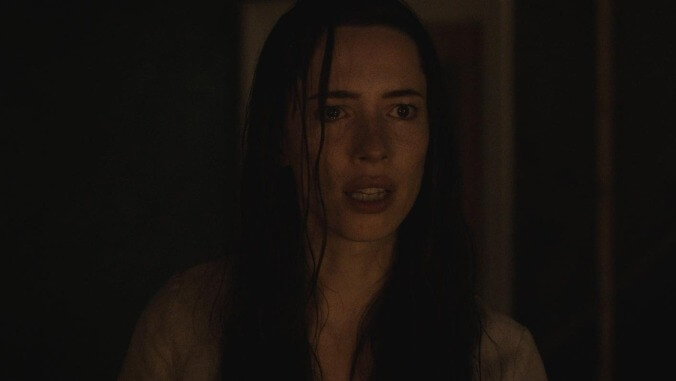When we first meet Beth, she’s on her way home from a funeral for her husband, Owen (Evan Jonigkeit), who died by suicide the week before. Ever since Owen’s death, Beth has been having cryptic dreams and feeling unearthly presences, leading the hardcore skeptic to wonder if maybe ghosts are real after all. (Owen was always the believer of the two.) Drawn into the woods by eerie intuition, Beth discovers that her husband was secretly building an exact double of their lakeside home, but with the floor plan reversed. Add a bizarre sculpture pierced with nails and a secret folder of creepy pictures on the dead man’s laptop, and it seems Beth didn’t really know her husband at all. Then the blood-red moons and body doubles begin to appear.
The Night House does effectively capture the confusing aftermath of a sudden and devastating loss. Beth doesn’t act like a person in mourning is “supposed” to act: Although an early scene sees her drowning her sorrow in brandy and casserole while watching her wedding video, she’s angry more often than sad. Hall is certainly up to the task of exploring the complexities of the grieving process, hostility flashing across her face as she meets well-meaning comments with withering sarcasm. The face she makes when a coworker meekly remarks that she “shouldn’t joke” about Owen’s suicide embodies all five stages of grief in one wordless expression. And the bitterness in her voice when she tells one of Owen’s many conquests that “the matter’s been resolved” is poisonous enough to kill a houseplant. A mess of contradictory emotions and impulses, Beth is more interesting and relatable than 99% of grieving wives in movies.
That messiness is less compelling when it comes to the story, however. Although Beth spends much of the film digging into Owen’s secret life, and eventually stumbles into a major revelation, some intriguing elements are left hanging. The same is true for the symbolism in Beth’s dreams, richly evocative of nothing in particular. Bruckner proves himself adept at both the low (i.e., jump scares) and the high (i.e., building sustained suspense) of horror craftsmanship, and Beth’s “Nothing” is embodied in some fresh ways that are enhanced by Hall’s committed acting, the best performing against an unseen scene partner this side of Elisabeth Moss in The Invisible Man. But what good is a painstakingly choreographed sequence with inventive effects and spine-chilling sound design if nothing comes of it?
It’s as if Bruckner started out making a haunted-house movie, saw what Hall was doing, and threw out the script in order to focus on her. Which is understandable—she’s a hell of an actress. But once the agony has drained from her hunched spine and the tears behind her twisted smile have been shed, what we’re left with is an unsatisfying shell of a horror story. All the elements are there, but there’s an unresolved quality to The Night House that drains the life from the film and leaves the viewer frustrated. If that’s another metaphor, this one for the way depression makes an otherwise happy life feel hollow, then well done. But that’s probably giving the movie too much credit.









































